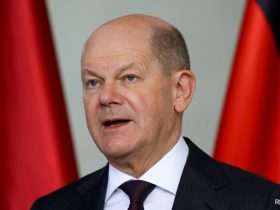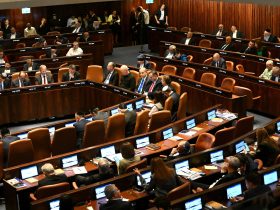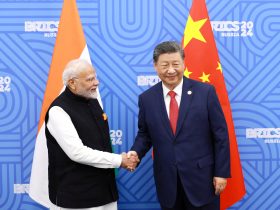Amid escalating regional tensions, voters within the self-declared state of Somaliland will vote on Wednesday in its fourth normal election since its 1991 break from Somalia. Whereas Somaliland now has its personal authorities, parliament, forex, passports and different options of an unbiased nation, nevertheless, its sovereignty stays unrecognised internationally as Somalia continues to view it as a part of its territory.
Within the capital metropolis of Hargeisa, supporters of the ruling Kulmiye (Peace, Unity and Improvement) Celebration crowded the streets in green-and-yellow-coloured shirts, chanting victory songs, with ladies ululating because the campaigning ended final week.
Incumbent President Muse Bihi Abdi is looking for a renewed five-year mandate within the election, delayed by two years due to time and monetary constraints, in keeping with authorities. His major challenger is former parliament speaker and opposition candidate Abdirahman “Irro” Mohamed Abdullahi of the Somaliland Nationwide Celebration, often known as the Wadani get together, which has promised extra roles for girls and younger individuals in his authorities.
The rising value of residing and territorial tensions with rebels within the disputed Las Anod, claimed by Puntland, one other autonomous area that broke away from Somalia in 1998, have emerged as the important thing points within the run-up to the election.
Crucially, the vote can be being formed by the candidates’ worldwide weight and what that would do for Somaliland, which is determined to be recognised as a separate nation.
President Abdi has touted his administration’s landmark “port-for-recognition” memorandum of understanding (MOU) for a cope with neighbouring Ethiopia, signed in January by him and Ethiopia’s Prime Minister Abiy Ahmed. The proposed deal would permit the bigger, landlocked Ethiopia to make use of Somaliland’s Pink Sea port of Berbera. In return, Ethiopia has stated it is going to undertake an “in-depth evaluation” of Somaliland’s quest for official recognition. In literal phrases, Ethiopia has not particularly stated it is going to recognise Somaliland. Nevertheless, authorities in Hargeisa see eventual recognition as the result.
The historic maritime MOU has brought on anger in Somalia, and relations between Ethiopia and Somalia have since just about collapsed. In October, Ethiopian diplomat Ali Mohamed Adan was expelled from Somalia in what’s simply the most recent in a protracted record of back-and-forth diplomatic spats.
Irro has capitalised on this fallout, blaming Abdi for being a divisive actor.
Egypt – Ethiopia’s longtime rival – and Turkey, an in depth ally of Somalia, have waded into the fray. Turkey has taken on the position of peacemaker by facilitating talks, whereas Egypt is backing Somalia by offering army help.
“The scenario has obtained extra tense with different actors getting concerned,” Hargeisa-based political analyst Mousafa Ahmad instructed Al Jazeera. “I’m not certain how the deal will undergo. I’d say it is extremely unpredictable.” There’s at present no set date for the deal to be made official.

The port deal: Worldwide recognition for Somaliland?
Ethiopia, Africa’s largest landlocked nation by inhabitants (greater than 120 million) has relied solely on tiny neighbour Djibouti’s ports to entry the Gulf of Aden for a while. After a three-decade-long conflict, Eritrea seceded from Ethiopia in 1993, inflicting the nation to lose entry to coastlines, one thing authorities there have all the time seen as hobbling its regional “huge energy” standing.
Addis Ababa has since then sought extra direct entry to the essential maritime routes round it, seeking to diversify from Djibouti’s choices. Final October, Prime Minister Abiy instructed parliament Ethiopia was surrounded by water however remained “thirsty”. Accessing the Pink Sea and the Nile would safe the nation’s future, he stated.
Beneath the Somaliland deal, Ethiopia will take a 50-year lease of the Berbera Port, affording Addis Ababa 20km (12.5 miles) of the Pink Sea shoreline for business marine operations and a naval base. The port was redeveloped in 2018 by Dubai agency and port supervisor DP World, which holds a 51 p.c stake in its operations. Hargeisa owns a 30 p.c stake within the public-private partnership, whereas Addis Ababa has now acquired a 19 p.c stake.
As well as, Hargeisa may even obtain a stake within the state-owned Ethiopian Airways, in keeping with the January deal, though particulars about this a part of the settlement are nonetheless scant.
Official recognition from Ethiopia might pave the way in which for international recognition, some analysts say, and lead different nations to commerce with Somaliland or open embassies there.
For Hargeisa, the deal seems nearly as good as finished. “We’re prepared and simply ready for Ethiopia to signal the deal,” President Abdi instructed reporters on the marketing campaign path earlier this month. Authorities try to market the port instead avenue to the Suez Canal the place ships face assaults from Houthi rebels. Domestically, it’ll be an financial “recreation changer” Abdi has stated, and is about to unlock about $3.4bn in revenues.
An influence change is unlikely to roll again native enthusiasm for the deal, analysts say, though the Wadani get together has criticised Abdi for dealing with the cope with Ethiopia in a divisive method. “From the Somaliland aspect, the deal continues to be on and shall be on even when there’s a change of presidency and Wadani wins the elections,” Ahmad stated.
When will that occur is one other query fully, although. Amid the regional fallout, Ethiopia has not but put a date on when the lease will take impact or when it might formally recognise Somaliland – in what some say may be an try and decelerate the method and never instantly escalate tensions.

Enemies in alliance?
At some point after the Somaliland port deal was introduced in January, the Ministry of International Affairs and Worldwide Cooperations (MFA) in Mogadishu issued an announcement declaring it “outrageous” and “blatant transgression” by Ethiopia, and that Somalia wouldn’t cede “one inch” of territory.
“We won’t stand by and watch our sovereignty being compromised,” President Hassan Sheikh Mohamud declared, addressing lawmakers in parliament. The identical day, Ethiopia’s ambassador was despatched residence.
Somalia additionally turned to Egypt – which is already at loggerheads with Ethiopia over a controversial $4bn dam challenge on the Blue Nile River. The dam controversy dates again to 2011 when Ethiopia started establishing the Grand Ethiopian Renaissance Dam (GERD) close to Guba in hopes of manufacturing some 5,000 megawatts of further electrical energy from the Nile – double the present availability for its energy-starved inhabitants.
Egypt, which additionally depends on the Nile, has vehemently opposed the challenge, arguing that the dam would devastate its water provides for agriculture and home use. Talks between the 2 nations have stalled, with Cairo accusing Addis Ababa of being too inflexible and threatening to “defend Egypt”. Ethiopia has stubbornly pressed on and started producing electrical energy from the dam in 2022.
In August, Egyptian President Abdel Fattah el-Sisi signed a defence pact with Somalia’s Mohamud to bolster safety. Throughout a summit in Asmara in October, el-Sisi and Mohamud joined Eritrea’s President Isaias Afwerki to pledge larger cooperation over regional safety.
Cairo has since delivered heavy army tools, together with weapons and armoured automobiles, loaded on a number of planes to Mogadishu in August and September, in an obvious present of power that has angered the Ethiopian authorities.
The army pact comes simply because the African Transition Mission in Somalia (ATMIS) involves an finish this yr. The peacekeeping mission, supported by the African Union, has been largely led by Ethiopia, which offers 4,300 troopers. It started in 2007 to defend Somalia towards the armed group al-Shabab. Uganda, Burundi, Djibouti and Kenya have additionally contributed troops.
Mogadishu has introduced that Ethiopia is the one nation to not be included in a separate alternative mission that may start its mandate on January 1, 2025. In the meantime, Cairo has introduced that it’s keen to deploy some 5,000 personnel to hitch the brand new formation. Egypt was not concerned within the first mission.
Different nations have additionally entered the row. Turkey, a longtime ally of Somalia, has tried to play peacemaker, mediating a number of rounds of talks in Ankara which have largely stalled and at the moment are indefinitely postponed. Turkey maintains a army base in Mogadishu.
Tensions between Djibouti and Ethiopia are additionally mounting. Djibouti, like Somaliland, lies to Ethiopia’s east and shares a border with the breakaway area. The small nation depends on its delivery industries for income and can be angered by the proposed deal between Somaliland and Ethiopia, which it sees as taking away a major supply of earnings. Presently, Djibouti processes greater than 90 p.c of Ethiopian maritime commerce.
Officers there have additionally condemned Hargeisa’s allegations that it’s funding, coaching and arming insurgent teams from Somaliland’s Issa and Gadabursi clans who’re looking for to manage territory. The accusations have been made after January’s port deal MOU.

‘No recognition, no deal’
Analysts are warning tensions might escalate so far as doable army motion between regional superpowers – Ethiopia and Egypt – if the scenario doesn’t quiet down.
“If the Egyptians put boots on the bottom and deploy troops alongside the border with Ethiopia, it might convey the 2 into direct confrontation,” Rashid Abdi, a Kenya-based analyst with the Sahan Analysis assume tank, instructed the Reuters information company. “The specter of a direct capturing conflict is low, however a proxy battle is feasible.”
To calm tensions, some specialists have cautioned Ethiopia towards recognising Somaliland formally whereas nonetheless leasing its port.
“Ethiopia can entry the ocean via Somaliland with out formal recognition,” writes analyst Endalcachew Bayeh within the tutorial publication, The Dialog, including that each powers should rethink their methods and “train restraint”.
Though Ethiopia despatched an envoy to Hargeisa in January, proper after the port deal MOU was signed, formally making it the primary nation to take action, it has not but signed the ultimate port lease and has not taken additional important steps.
In the meantime, Somaliland authorities reiterate they’re able to formally begin the port settlement with Ethiopia regardless of the regional pushback. In obvious solidarity with its new ally, Somaliland shut down an Egyptian cultural centre in Hargeisa in September.
Taking the popularity deal off the desk is just a non-starter for Somaliland, analyst Ahmed stated.
“Somaliland authorities and persons are very clear about this – the popularity is the start line for the cooperation,” he stated. “From Somaliland’s perspective, it’s no recognition, no deal.”







